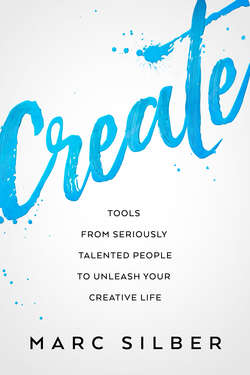Читать книгу Create - Marc Silber - Страница 19
На сайте Литреса книга снята с продажи.
ОглавлениеWhen did you first flip the switch to having a fully creative life?
I made the choice when I was nineteen and I quit my job and quit school to pursue photography. At the time it wasn’t really about creativity. It was just more about making a living, doing something that I loved, and I think the concept of embracing some sort of career path that would lead me to interesting places and interesting people and an understanding of the world was really my draw.
I think that inadvertently it led me to a place where creativity kind of reigned supreme. It led me to a place where I could foster creativity; that’s always been my biggest takeaway. Creativity is not something you just have all the time, you have to set parameters, you have to create barriers or walls or guidelines for yourself to live with so that you could foster a creative life or foster a creative environment.
That’s really the key component. I think for me over time things have become more and more creative or I’ve been able to operate in a more and more creative capacity because I’ve done that.
What were the biggest barriers you had to overcome to make that happen?
A big one was just mainly dealing with my own self-worth and self-validation. When you submit your work and you never have any type of positive feedback, it can be really challenging. That’s a really hard thing to do. I think the first and biggest struggle people deal with is self-worth. You have to come to—“my work is valuable.” That’s a conclusion you have to come to on your own. And that’s a really hard one to just figure out.
How did you come to that conclusion?
I didn’t. I decided slowly over time, like dew forming: it’s super slow, you can’t even watch it, there’s no turning point. People always ask me, “When did they just click?” And there’s no such thing as when things click. If you want to talk about overnight success, it took twelve years of overnight success. The reality is I chose not to think about that. I just put my head down and did my work and there were small successes along the way. There were a lot of failures for the most part. I think that what you find is that even if you do receive great praise from one of your heroes, that’s only going to take you so far.
At a certain point, you have to realize that all that validation, all of that earning a paycheck, collecting stamps in your passport—is not going to mean anything to you unless you find a purpose greater than those things, a purpose that creates passion. Passion alone is not creative. Nobody ever said, “I’m passionate about what I do because somebody said so.” Or “I’m passionate about what I do because it pays the bills.” That’s not true. That’s totally the opposite.
So I think it’s key to understand that at a certain point you have to figure out what you’re passionate about and you have to foster that. Usually that requires some introspection and some time for reflection—a spirit quest, whatever you want to call it, to understand what makes you you and what drives you. For me it was the ability to share stories with my family, those who sacrificed a lot for me, and my mom. I think I felt really indebted to her for raising me and for other reasons. So I’m just giving you a very simple slice of what drives me. But ultimately that’s really what it comes down to.
